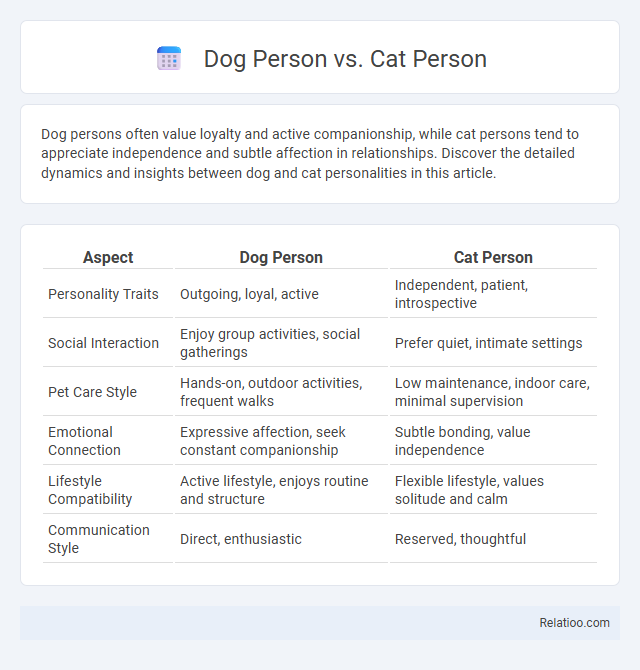Dog persons often value loyalty and active companionship, while cat persons tend to appreciate independence and subtle affection in relationships. Discover the detailed dynamics and insights between dog and cat personalities in this article.
Table of Comparison
| Aspect | Dog Person | Cat Person |
|---|---|---|
| Personality Traits | Outgoing, loyal, active | Independent, patient, introspective |
| Social Interaction | Enjoy group activities, social gatherings | Prefer quiet, intimate settings |
| Pet Care Style | Hands-on, outdoor activities, frequent walks | Low maintenance, indoor care, minimal supervision |
| Emotional Connection | Expressive affection, seek constant companionship | Subtle bonding, value independence |
| Lifestyle Compatibility | Active lifestyle, enjoys routine and structure | Flexible lifestyle, values solitude and calm |
| Communication Style | Direct, enthusiastic | Reserved, thoughtful |
Understanding Dog People and Cat People
Dog people often exhibit traits such as extroversion, loyalty, and a preference for active lifestyles, reflecting their engagement in regular outdoor activities and social interactions. Cat people tend to value independence, creativity, and introspection, often enjoying quieter environments that accommodate their pets' solitary nature. Understanding these personality tendencies helps explain lifestyle choices and daily routines influenced by the distinct behavioral needs of dogs and cats.
Personality Traits of Dog Lovers
Dog lovers often exhibit personality traits such as high extroversion, increased sociability, and a strong sense of loyalty. They tend to be more active, enjoy outdoor activities, and value companionship and protection from their pets. Studies show dog owners are generally more agreeable and open to new experiences compared to cat owners.
Personality Traits of Cat Lovers
Cat lovers often exhibit traits such as independence, creativity, and a preference for introspection, reflecting the nature of their feline companions. They tend to appreciate subtlety and enjoy quiet, contemplative environments, valuing personal space and emotional depth. This personality profile contrasts with dog lovers, who are generally more extroverted and sociable, highlighting how pet preference aligns with individual lifestyle choices.
Social Interactions and Bonding Styles
Dog persons often exhibit outgoing social interactions and form strong, loyal bonds through shared outdoor activities, fostering a sense of community and companionship. Cat persons tend to prefer more introspective and selective social engagement, valuing deep, independent connections that emphasize mutual respect and calm presence. Understanding your preference in pets can reveal insights about your social tendencies and bonding styles, influencing how you relate emotionally and engage with others.
Lifestyle Preferences: Dogs vs Cats
Your lifestyle preferences significantly influence whether you lean toward being a dog person or a cat person. Dog owners often enjoy active routines, outdoor activities, and social interaction, as dogs require regular exercise and companionship. Conversely, cat owners may prefer a more flexible and low-maintenance lifestyle, appreciating the independence and calm presence cats provide in a home environment.
Pet Training Challenges and Rewards
Dog owners often face challenges like consistent obedience training and managing high energy levels, yet benefit from enhanced social interaction and loyalty. Cat owners encounter unique difficulties such as litter box training and fostering affection, balanced by lower maintenance and independent companionship. Lifestyle factors influence these pet training experiences, with active individuals gravitating toward dogs for outdoor activities, while those with quieter routines prefer cats for their self-sufficiency.
Health Benefits of Owning Dogs and Cats
Owning dogs offers numerous health benefits, including increased physical activity through daily walks, which improves cardiovascular health and reduces stress levels. Cats contribute to mental well-being by providing companionship that lowers anxiety and promotes relaxation without requiring extensive exercise. Your lifestyle can significantly improve by choosing a pet that aligns with your health goals, whether it's the active engagement of a dog or the calming presence of a cat.
Common Myths About Dog and Cat People
Dog people are often stereotyped as more outgoing and energetic, while cat people are labeled introverted and independent, but recent studies reveal these traits vary widely within each group. Your lifestyle choices can shape pet preferences, yet common myths exaggerate personality differences between dog and cat owners. Understanding the diversity among pet lovers helps break down inaccurate assumptions and fosters greater appreciation for all animal companionship styles.
Choosing the Right Pet for Your Personality
Dog persons thrive in active lifestyles due to dogs' need for regular exercise and companionship, making them ideal for outgoing, social individuals. Cat persons prefer a more independent pet that adapts well to quieter, indoor environments, fitting those who value low-maintenance companionship. Assessing daily routines, energy levels, and social habits is crucial to choosing between a dog or cat, ensuring alignment with personal lifestyle and pet care commitment.
Celebrating the Unique Joys of Both Pets
Dog lovers thrive on the energetic companionship and loyalty that dogs provide, which complements active, outdoor lifestyles and social gatherings. Cat enthusiasts appreciate the calming presence and independent nature of felines, perfect for tranquil home environments and those seeking low-maintenance affection. Embracing both dog and cat companionship offers diverse emotional benefits, fostering joy through unique interactions tailored to individual lifestyle preferences.

Infographic: Dog Person vs Cat Person
 relatioo.com
relatioo.com